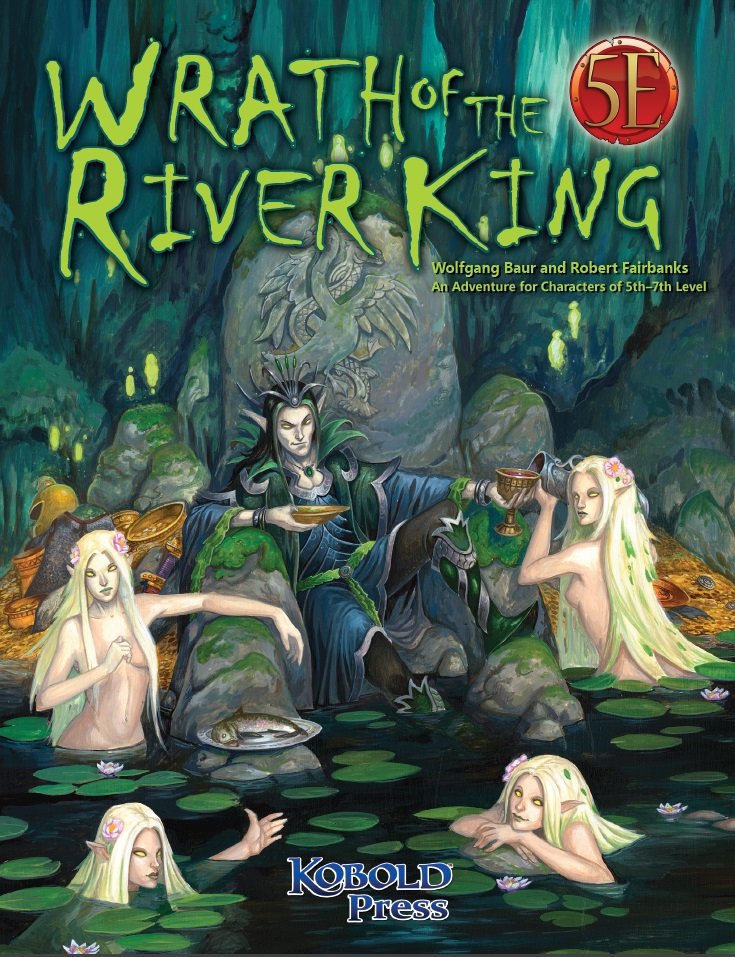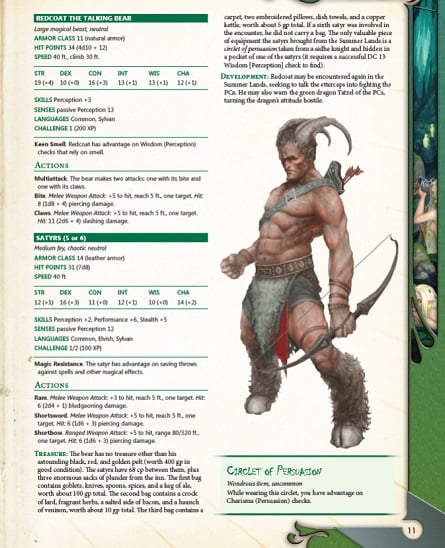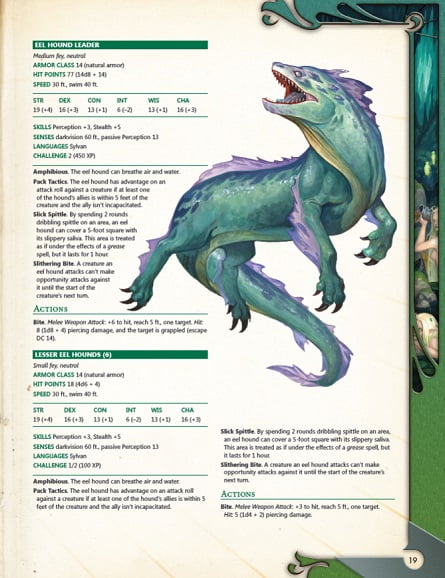Description
Face the River’s Fury!
In the small hamlet of Riverbend, the miller’s wife is missing, and the locals suspect that the husband himself was involved. But all is far from what it seems. Ellessandra, the missing woman, is actually an elf from the Summer Lands. She came to live in the human settlement when the miller made a dangerous pact with the River King, the lands’ powerful sidhe ruler.
Now, the player characters must unravel the truth behind Ellessandra’s disappearance, piece together the involvement of a young brownie-turned-fey-lord, and dive into the fey courts of the Summer Lands to stop a raid that would surely spell Riverbend’s doom. All the while, Arthurian intrigue and mischief runs high among the fey lords and ladies in this mercurial, open-format adventure from acclaimed adventure designer Wolfgang Baur!
This 5th Edition Roleplaying Game adventure for 5th- through 7th-level characters is full of hijinks and trickery, and fits nicely into any campaign setting in which fey are regal. Their courtly plots are dangerous and will test bold adventurers’ skills to the limit!




Endzeitgeist –
An Endzeitgeist.com review
This module clocks in at 70 pages, 1 page front cover, 1 page editorial, 1 page backer-thanks/introduction, 1 page ToC, 2/3 of a page SRD, 1 page back cover, leaving us with 64 1/3 pages, so let’s take a look!
This is an adventure-review and as such, it contains SPOILERS. Potential players should jump to the conclusion.
…
..
.
Okay, so before we begin: This is one of the modules that perfectly encapsulates what sets Midgard apart from your run-of-the-mill fantasy setting, for its begin in the small village of Riverbend is steeped in the feudal structures that should be inherent in all fantasy worlds.
Let me elaborate: The miller in ancient times doubled as a taxman of sorts and was directly put in charge by the respective lords: There was no free choice of where to go, etc. and you had to pay miler and lord when having your grain processed. It is thus that the stereotype of the greedy miller came into being. An edge of the sinister had always stuck to the profession in a fairy tale-context, one perfectly exemplified by Ottfried Preußler’s “Krabat”, building on the classic Wendish legend. Not only does the book perfectly highlight the horrors of love and war and poverty, its use of mystical numbers and general plotline have influenced magical traditions in my own games for ages. It is, in short, glorious and if your German is serviceable, I’d strongly recommend the folk-rock cd “Zaubererbruder” by ASP, a poetic and really catchy version of the tale that has some really smashing tunes like “Denn ich bin Dein Meister” (“For I am your master”) or a brilliant portrayal of a duel of polymorphing cat and mouse – literally! For more electronically-minded folks out there – Stillste Stund’ – Mühle mahlt.
I digress, back to Riverbend: The miller here, as often, was the target of not an undue amount of jealousy…and worse, he actually had an elven wife! (Note: In Midgard, elves are VERY rare and considered to be closer to fey than regular mortals, making them feel more mythological.) The elven wife of miller Froderick has vanished, alongside with his millstone and people are pretty sure he has murdered her…after all, someone who consorts with fey is prone to be suspicious, particularly if he’s also the miller! The presence of the fantastic is making itself felt in town, with the omnipresent fey (exemplified as bugbears and forest imps) making the area dangerous…oh, and guess what: poor Froderick is facing the gallows if the PCs don’t help him. Indeed, investigation of Riverbend may yield the PCs some interesting information: For one, a band of satyrs with a talking bear have taken refuge at the local inn, much to the panic of the local population. Getting them out will require a complex skill-check-interaction…which brings me to one of my favorite parts in the module, at least from a design perspective.
You see, this was originally released for D&D 4th edition and while I loathe that system, its skill challenge mechanic is interesting: Basically, you set a complex task in front of the party and allow the respective PCs to accumulate success and failures based on skill-use. Let me make up an example to illustrate the concept: A tree blocks a trade road. The mage may use Strength (Athletics) to use bruta force to attempt to move it; the ranger uses Wisdom (Survival) to discern the best ways to hack it apart, the druid use Animal Handling to make the horses draw the tree away. Sure, you could depict that in sequence, but the beauty of complex skill challenges lies in the variety of options and the teamwork aspect inherent in besting them. Regarding the satyrs, there are a ton of DCs for different venues of roleplaying to attempt to make them leave, often differentiating between different strategies – a smartly PLAYED character will face a lower DC than one whose players goes “whatever, I roll skill xyz” – this, organically, fosters teamwork as well as roleplaying. Success and failure are contingent on amassing successes as a group before accruing a certain amount of failures. The system is ridiculously easy to understand and I sometimes wish that particularly deadly traps used such a system more often, instead of relying on one roll. So yeah, the inclusion and proper conversion of these skill challenges is a big plus for me and I can’t figure out any drawback to their inclusion – I am very happy that the conversion to 5e managed to translate them as well.
Beyond the satyrs, there is a flaxen-eyed kid in the mill – who is very nervous and claims that it belongs to him. The PCs don’t yet know that…but this boy is Froderick’s son. Ellesandra, his missing wife, was pregnant and raised the boy in the Summerlands, where time follows different laws….a magical place which can, just fyi, be accessed by the mill pond…which also explains the presence of a rather potent sidhe knight and his squire there, and they’re not pleasant beings.
Speaking of not pleasant: The module makes an excellent display of highlighting the strange and capricious nature of fey, while staying true to the myths: If the PCs take a look at the accounts of Froderick, they may well find out that there is something missing. Confronted with this discrepancy, the strange coincidences may make suddenly sense, as Froderick confesses to having had an enchanted millstone that he had to grind each day in order to keep his wife’s love. Oh, and his wife was gifted to him by a fairy lord, to whom he was sending the missing tribute. But he vehemently denies being the shape that was seen attempting to drown his wife. (On an aside: Morally compromised, but well-meaning man, young and gorgeous wife that is only kept entranced with him, courtesy of his toil…you can see some nice social commentary here…yep, the like has even existed back in the times quoted by fairy tales…)
It seems that the PCs will have to dive deeper into the matter at hand and brave the mill pond if they want to get to the bottom of this mystery…literally here, for the tithe collector of the fairy, one nasty hag (who also, coincidentally, knew about the miller skimping on the due amount and who is the culprit of the attempted drowning) has sunk the mill stone in the mill pond…so the PCs will have to dive down…and there, finally, brave a kind of mini-game, if you will, as you’re diving into the river – getting to shore in the lands of the fey will be not an easy task and may cost them some items, at least temporarily – once more, something I applaud. I am actually one of the GMs who likes destroying PC items and the like…but I digress. Once the PCs have managed to reach shore, things turn very much wondrous, as the Summerlands feel, without a doubt, like a realm both wondrous and magickal, as PCs get a chance to encounter eel hounds, witness the dance of moths, deal with frog-riding goblins…and save Elessandra from a fey bandit. The elven lady is willing to fill the PCs in on her marriage being arranged, and consequently, that the woman has no intention of ever returning to the realms of mortals. Her wedding ring makes for a somber way of hopefully getting the miller off the gallows, but while the GM may elect for this encounter to just happen, it is very much at this point that the linearity you’d expect from a module like this…completely vanishes.
Sure, there are aspects that can be presented in a certain sequence, but, at this point, any remotely capable GM and group can either go in sequence through the specific dressings and NPC/monster-encounters, sure – but the goal itself and how they achieve it will depend in a very nice emphasis of player-choice highly upon the interaction with the mythologically-resonant cast of character: You see, with the miller not delivering the proper tribute, Riverbent is actually bound to become part of the Summerlands unless the deal with the fey lord can be renegotiated and the River King’s wrath quelled. Oh, and even if the PCs just want to run…well, they may have access to a means to escape, unreliable though it may be.
Thing is: Fey are elitist. And cold. And alien. And they seem to have taken a liking to some of the feudal structures seen among the mortals – thus, the PCs will definitely need to make some allies with powerful entities…and the entities being fey, well, let’s just say that strings will be attached, new roleplaying potential generated as the PCs make their impact known among the noble fey. In fact, the PCs may even claim a title, encounter the dragon Tatzel and there would be the Birch Queen’s magnificent and unearthly fair to visit. An evil lord of verminous butterflies, scorched treants and similarly wild beings allow for plenty of deadly encounters…or corresponding opportunities for roleplaying opportunities with some of the most interesting creatures to interact with in a while.
In order to save Riverbent, the PCs not only have to reach the source of the river and gain access to the court of the river king, they will also need to make a case for the claim of Lord Flax on the lands being spurious…and negotiating with a personified force of nature is not an undertaking to be taken lightly or disrespectfully. Fey are capricious, though, and the hag may well demand for a duel…oh, and in order to return to the mortal world, the PCs will have to defend the fairy-realm version of the mill from the forces of Flax in a furious siege…and, much like real-world fairy tales, this ends with a melancholy and bittersweet note, for Flax is truly Froderick’s son, the humble kid the PCs saw before, grown quickly and prematurely, providing a somber tone to contrast with the wondrous and impressive nature of the summerlands. When mortals tangle with the fey, sorrow will be the toll for the wonders witnessed.
We conclude the adventure with stats for the courtiers of the river king.
Conclusion:
Editing and formatting are very good. I have noticed a couple of minor hiccups, but nothing grievous. Layout adheres to a gorgeous two-column full-color standard. The pdf sports several unique and beautiful full-color artworks and the pdf version comes fully bookmarked for your convenience. The cartography is glorious full color, and the maps for the encounters are really nice, but very small. It is a pity that, much like the PFRPG-version, we get no full-page versions of the maps. Furthermore, we get no player-friendly versions of the maps sans keys, which sucks. So no, if you’re planning on doing this with VTT or with printed-out maps, you’ll have some serious work on your hand. At this point, several publishers provide layered and even multiple player-friendly versions of the maps. I don’t get this needlessly annoying inconvenience.
Wolfgang Baur’s Wrath of the River King, back in the day, was a blind spot in my Midgard collection – since it originally was only made for 4th edition, it took several years until the PFRPG-conversion allowed me to complete my collection. When I finally got my hands on this book, I was surprised to see its relative brevity… but don’t be fooled: There is a metric TON of gaming to be had from this module. I’d be seriously surprised if any group can finish this book in anything below 6 full-day sessions unless they skip everything: This book not only manages to create an ambiance wondrous and miraculous, it also, much like the excellent “Courts of the Shadow Fey”, truly GETS fey. (As an aside – here’s to hoping for a 5e-version of that fantastic masterpiece as well!)
This module is very much is all about the wondrous fey that are in tune with nature; this pdf pits the PCs against an alien and intriguing incarnation of the capricious forces of nature, in all their wonder and destructive, alien, uncaring splendor. From the small dressing bits to the NPCs and environments, the module oozes flavor from every single word and manages to be extremely concise while doing so. There is much more gaming in this module than in several modules of twice that size.
Better yet: The 5e-conversion by Robert Fairbanks and Thomas M. Reid manages to retain all the aspects I loved about the PFRPG-version, managing to expertly translate them to 5e. This adventure belongs in the hall of fame of the precious few modules that truly manage the feat to tap into the wonder and feeling of fairy tales and translate it to the medium of roleplaying games, only being paralleled by the amazing Courts of the Shadow Fey and AAW Games’ superb Snow White for PFRPG. (Both of which have decent chances of showing up for 5e at some point, so keep your fingers crossed!)
This is a true gem that basically demands a place of honor on your shelf next to these classics. The adventure manages to cram an insane amount of crunchy bits in its page-count, it also manages to perfectly evoke the sense of the fantastic. This should be considered to be one of the modules that need to be experienced by anyone who even halfway enjoys the world of Midgard, a module that I’d consider core-canon and brilliant.
Particularly the beauty of the ending and its resonance of classic tropes is genius and an emotional note only few modules manage to hit. Now, the PFRPG-version of this module managed to score a honorable mention on my Top Ten of 2016, missing a spot only due to the lack of player-friendly maps. I have a policy of different iterations of a supplement only qualifying once for a Top Ten entry, so instead of being a candidate for my Top Ten of 2018, this should be considered to share the Honorable Mention spot of its PFRPG-version. This is an outstanding adventure and well worth getting. My final verdict will clock in at 5 stars + seal of approval.
Endzeitgeist out.